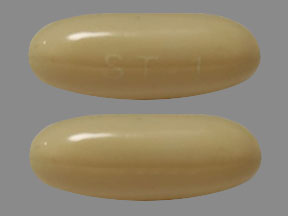
Valproic Acid Coupons & Savings Card – Discount Prices from $49.00
Valproic acid is a medication primarily used to manage seizure disorders, certain mental health conditions like the manic phase of bipolar disorder, and to prevent migraine headaches. It functions by restoring the balance of natural chemicals, known as neurotransmitters, in the brain. As an antiepileptic drug, it is effective in treating specific types of seizures, such as focal impaired awareness and absence seizures. The exact mechanism by which valproic acid controls seizures isn't completely understood, but it is believed to increase the production of gamma-aminobutyric acid (GABA), a chemical that helps to reduce excessive brain activity. Available in capsules and oral solution, the dosage is tailored by healthcare providers based on individual factors such as body weight and symptoms. Common side effects can include tremors, nausea, and headache, while serious liver problems, though rare, may occur. It is crucial to avoid use during pregnancy due to the risk of birth defects. Always consult with a healthcare professional before starting any new medication regimen.
Our coupons are free to use. Before paying, show the pharmacist your Valproic Acid savings card to get your free discount. Use our filters below to edit the prescription box to match your needs. The Valproic Acid prices will update based on your prescription needs. Above our Valproic Acid coupons, you can change your location to see pharmacy prices and costs in other areas. We're here to help you buy Valproic Acid at the lowest price with our prescription discount card.
My prescription
Edit
250MG, Valproic Acid (180 Capsules)
Select pharmacy

CVS
$49.00
COUPON PRICE
Walmart
$52.68
COUPON PRICE
Walgreens
$54.71
COUPON PRICE
Albertsons
$56.81
COUPON PRICEValproic Acid savings card
Show this card to your pharmacist
CVS
$49.00
BIN
ID
PCN
GRP
011867
LH4E03FF1B
HT
LABH001
Powered by
Valproic acid is a medication primarily used to manage seizure disorders, certain mental health conditions like the manic phase of bipolar disorder, and to prevent migraine headaches. It functions by restoring the balance of natural chemicals, known as neurotransmitters, in the brain. As an antiepileptic drug, it is effective in treating specific types of seizures, such as focal impaired awareness and absence seizures. The exact mechanism by which valproic acid controls seizures isn't completely understood, but it is believed to increase the production of gamma-aminobutyric acid (GABA), a chemical that helps to reduce excessive brain activity. Available in capsules and oral solution, the dosage is tailored by healthcare providers based on individual factors such as body weight and symptoms. Common side effects can include tremors, nausea, and headache, while serious liver problems, though rare, may occur. It is crucial to avoid use during pregnancy due to the risk of birth defects. Always consult with a healthcare professional before starting any new medication regimen.
Our coupons are free to use. Before paying, show the pharmacist your Valproic Acid savings card to get your free discount. Use our filters below to edit the prescription box to match your needs. The Valproic Acid prices will update based on your prescription needs. Above our Valproic Acid coupons, you can change your location to see pharmacy prices and costs in other areas. We're here to help you buy Valproic Acid at the lowest price with our prescription discount card.
More prescriptions for epilepsy
coupons from$92.86Save 81%
coupons from$801.63Save 21%
coupons from$80.19Save 79%
coupons from$37.79Save 77%
coupons from$230.88Save 86%
coupons from$34.55Save 81%
coupons from$18.08Save 78%
coupons from$13.18Save 90%
More prescriptions for epilepsy
Topiramate ER Save 81%coupons from $92.86
Elepsia Xr Save 21%coupons from $801.63
Qudexy Xr Save 79%coupons from $80.19
Ethosuximide Save 77%coupons from $37.79
Oxtellar Xr Save 86%coupons from $230.88
Epitol Save 81%coupons from $34.55
Phenytoin Infatabs Save 78%coupons from $18.08
Depakote Save 90%coupons from $13.18
Valproic Acid dosage forms
Use our Valproic Acid 250MG coupon with prices from $51.39 for 180 Capsules. You can also use our Valproic Acid 250MG coupon with prices from $9.78 for 30 Capsules. We have a Valproic Acid 250MG coupon with prices from $17.06 for 60 Capsules. You can use our Valproic Acid 250MG coupon with prices from $24.34 for 90 Capsules.
Dosage Quantity Price from Per unit 250MG 180 Capsules $51.39 $0.28 250MG 30 Capsules $9.78 $0.33 250MG 60 Capsules $17.06 $0.28 250MG 90 Capsules $24.34 $0.27 250MG 100 Capsules $26.77 $0.27 250MG 120 Capsules $31.62 $0.26 250MG 240 Capsules $59.76 $0.25 250MG 360 Capsules $76.48 $0.21
| Dosage | Quantity | Price from | Per unit |
|---|---|---|---|
| 250MG | 180 Capsules | $51.39 | $0.28 |
| 250MG | 30 Capsules | $9.78 | $0.33 |
| 250MG | 60 Capsules | $17.06 | $0.28 |
| 250MG | 90 Capsules | $24.34 | $0.27 |
| 250MG | 100 Capsules | $26.77 | $0.27 |
| 250MG | 120 Capsules | $31.62 | $0.26 |
| 250MG | 240 Capsules | $59.76 | $0.25 |
| 250MG | 360 Capsules | $76.48 | $0.21 |
